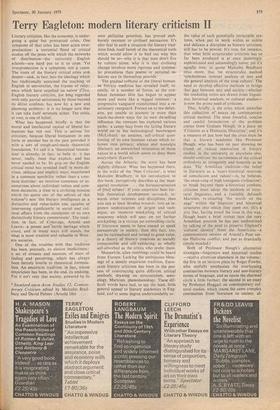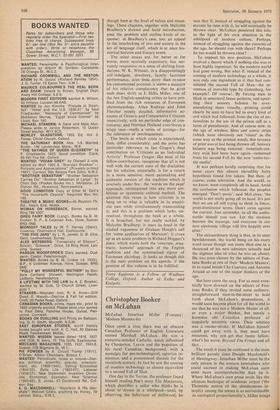Terry Eagleton: modern literary criticism II
Literary criticism, like the economy, is under- going a quiet but protracted crisis. One symptom of that crisis has been acute over- production: a torrential flood of critical studies off the press with which the networks of distribution—the university English schools—are hard put to it to cope. Yet overproduction is a symptom, not a cause. The roots of the literary critical crisis sink deeper—sink, in fact, into the ideology which has traditionally sustained the teaching of English in universities, the frames of refer- ence which have supplied its raison d'être. English literary criticism, for long regarded with only partial seriousness by those beyond its elitist confines, has now hit a new and alarming problem: it is no longer sure that it can take itself seriously either. The crisis, at root, is one of belief:
What has happened, briefly, is that the moral and intellectual capital of liberal hu- manism has run out. This is serious for criticism, because liberal humanism in one form or another has in the past provided it with a sort of rough-and-ready theoretical foundation. To call it a `theoretical founda- tion' is already, in fact, to belie it: it has never, really, been that explicit, and has never needed to be. Its grip. on the English critical mind has revealed itself in more-de- vious, oblique and implicit ways, manifested in a common sensibility rather than a com- mon doctrine: an intuitive consensus of as- sumptions about individual values and com- mon decencies, a trust in a civilising mission which (to quote one of the editors of this volume*) sees 'the literary intelligence as a distinctive and value-laden one, capable of intervening significantly in social and cul- tural affairs from the standpoint of its own distinctively literary commitment'. The tradi- tion, in fact, of Coleridge, Arnold and Leavis: a potent and 'fertile heritage which stood, and in many ways still stands, for what is most creative and valuable in West- ern societies.
One of the troubles with that tradition has been, precisely, its elusive implicitness: a set of stresses and nuances, of ways of feeling and perceiving, which has always been fiercely hostile to theoretical formula- tion. An empiricist tradition, in fact, whose empirioism has been, in the end, its undoing. For it isn't only that society, powered by its
* Stratford-upon Avon Studies 12: Contem- porary Criticism edited by Malcolm Brad- bury and David Palmer (Arnold 18s)
own philistine priorities, has proved stub- bornly resistant to civilised persuasion. It's also that in such a situation the literary trad- ition finds itself bereft of the theoretical tools which would allow it to find out why this should be so—why it is that men don't live by culture alone, why it is that civilising change involves more rigorous and systema- tic procedures than poems or personal re- lations can in themselves provide.
The gradual collapse of the liberal human- ist literary tradition has revealed itself, re- cently, in a number of forms, as the con- fident Jamesian elite has begun to appear more and more like a ragged remnant: a progressive vanguard transformed into a re- actionary rearguard. Forced on to the defen- sive, yet unable to account in more than reach-me-down ways fOr its own dwindling influence, the remnant has explored various paths: a canny leap from the failing literary world on to the technological bandwagon (McLuhan); an anxious, self-critical ques- tioning of its own humane values which re- lapses into privacy, silence and nostalgia (Steiner); an entrenched reiteration of those values in a world which seems to deny them everywhere (Leavis).
Across the Atlantic, the story has been slightly different. What has happened there, in the wake of the `New Criticism', is what Malcolm Bradbury, in his introduction to this book, perceptively describes as the 'man- agerial revolution . . . the bureaucratisation of [the] subject'. If your empiricist bent for- bids theoretical development outwards, to- wards other interests and disciplines, then you can at least develop inwards, into an in- grown sophistication of jargon and tech- nique, an intensive stockpiling of critical weaponry which will spur on yet further stockpiling, in a vicious yet enthralling circle. If literature seems to have ceased to speak persuasively to society, then this fact, too, can be rationalised and turned to good value, in a theory of literary creations as socially irresponsible and self-validating, as wholly self-absorbed as the critics who probe them.
Meanwhile, alien rumblings could be heard from Europe. Lacking the ambiguous bless- ings of a stoutly empiricist tradition, Euro- pean literary criticism has been in the pro- cess of constructing quite different critical methods, drawing on structuralism, semi- ology, Marxism, phenomenology. These dif- ficult words have had, to say the least, little general appeal to literary academics in Eng- land, and to some degree understandably so: the value of such potentially intractable sys- tems, when put to work within as subtle and delicate a discipline as literary criticism, still has to be proved. It's true, for instance, that what little structuralist criticism has so far been produced is at once dauntingly sophisticated and astoundingly naïve; yet it's equally true, to quote Malcolm Bradbury once more, that the structuralist method 'synchronises internal analysis of text and the general analysis of the total culture'. The need to develop effective methods to bridge that gap between text and society—whether the mediating terms are drawn from linguis- tics, historical analysis, or cultural studies— is now the prime need of criticism.
That, briefly, is the crisis which underlies this collection or essays on contemporary
critical method. The most forceful, concise and candid formulation of the problem comes from Graham Hough, in a piece on 'Criticism as a Humanist Discipline': -and it's a measure of just how bad the crisis must be that a literary academic like Professor Hough, who has been on past showing no friend of radical innovation in literary studies, in the university or anywhere else, should confront the narrowness of the critical orthodoxy as stringently and honestly as he does. The Arnoldian tradition—the belief in literature as a 'supra-historical reservoir of consolation and values'—is, he believes, 'the swan-sang of high bourgeois civilisation': to break beyond these a-historical confines, criticism must adopt the methods of struc- tural linguistics and a (suitably defused) Marxism. re-situating 'the words on the
page' within the linguistic and historical structures into which they open out. (It's a
pity that, having posed the issue in this way, Hough beats a brief retreat into the very Arnoldian position he has just undermined by talking of the need to preserve England's 'cultural identity' from the Americans--a contemporary version of Arnold's Poet ver- sus Philistine conflict, and just as drastically simple-minded.) Both of Professor Hough's alternative strategies—linguistics and historical studies —receive attention elsewhere in the volume; the first in an incisive piece by Roger Fowler, who usefully emphasises the overlapping continuities between literary and non-literary forms of language, and so opens the charmed circle a little further; the second in an essay by Professor Hoggart on contemporary cul- tural studies, which traces the same complex continuities from literature to society, al- though here at the level of values and mean- ings. These chapters, together with Malcolm Bradbury's shrewd and lucid introduction, pose the problem and outline kinds of re- sponse: in Bradbury's case, too, an appeal to the interlocking of text and society in the act of language itself, which is at once his- storical horizon and literary event.
The other essays are, for better or for worse, more neutrally expository, less ner- vously responsive to a sense of shifting foun- dations. W. K. Wimsatt, in a disappointingly self-indulgent, desultory, faintly facetious performance, does little more than re-state his conventional position; it seems a measure of his relative complacency that he gives such short shrift to J. Hillis Miller, one of the few English-speaking critics to have pro- fited from the rich resources of European phenomenology. Allan Rodway and John Fletcher supply detailed, informative ac- counts of Generic and Comparative Criticism respectively, with no particular edge of con- troversy; and Norman Holland contributes a wispy case—really a series of jottings—for the relevance of psychoanalysis.
The levels at which crisis is experienced, then, differ considerably; and the point has particular relevance to Ian Gregor's final contribution on 'Criticism as an Individual Activity'. Professor Gregor, like most of his fellow-contributors. recognises that all is not well with the current state of the discipline; but his solution, essentially, is for a return to a more sensitive, more painstaking and authentic version of the tradition which is precisely under fire: the 'words on the page' approach, unintegrated into any more am- bitious or systematic cultural method. The question this raises is how criticism is to hang on to what is valuable in its empiri- cist past while simultaneously transcending it; and this is a problem which lurks, un- resolved, throughout the book as a whole. It is broached, but not really tackled, by Malcolm Bradbury; it rears its head in the studied vagueness of Graham Hough's call for 'some application of Marxism': it crops up as an acute problem in Richard Hoggart's piece, which wants both the 'concrete, prag- matic. humane' approach of the English tradition and the systematised rigour of European sociology. It looks as though this is the next problem on the agenda, if the promise of this volume is to be fulfilled.
Terry Eagleton is a Fellow of Wadhanz College, Oxford. Author of Exiles and Emigres.


































 Previous page
Previous page